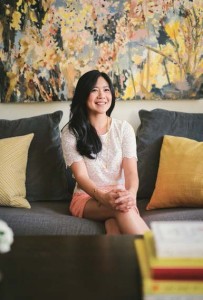
Tze Chun ’02 is five-feet-three-inches tall and as lithe as you would expect a dancer to be. She’s an uncommon combination of radiant warmth and fierce focus. That focus has helped her complete a self-crafted double major at Columbia, run a bartending agency of more than 200 employees at age 19, and found the thriving Tze Chun Dance Company. Her passion is art, and these days Tze concentrates her entrepreneurial vision on her newest venture, Uprise Art. An online gallery of contemporary art, Uprise welcomes new collectors as well as the more experienced. The gallery offers those collectors with, perhaps, more vision than liquidity the option of investment over time.
“I knew all these talented, emerging visual artists who were struggling to get the attention of wealthy, established collectors. It was a very unnatural dynamic,” says Tze. Friends of hers from Columbia—many of whom were successful professionals—had beautiful apartments and were craving culture, but they didn’t have time to visit galleries.
At the same time, online art platforms were emerging. Sites like 20×200 and Saatchi Online were attracting attention. Tze saw an opportunity, but she wanted to do it her own way.
“New collectors often don’t know which galleries to go to, what questions to ask or how to evaluate the price of a piece,” she says. “I went down the list of potential roadblocks and tried to figure out how to make them all go away.”
 The option to buy in installments was Tze’s hook, and what she felt would fuel the company’s growth. As with any start-up, however, results can migrate in unexpected ways. Now, more than half of Uprise’s collectors purchase art outright. Servicing a host of seasoned collectors means Uprise must be on the ground at art fairs around the world.
The option to buy in installments was Tze’s hook, and what she felt would fuel the company’s growth. As with any start-up, however, results can migrate in unexpected ways. Now, more than half of Uprise’s collectors purchase art outright. Servicing a host of seasoned collectors means Uprise must be on the ground at art fairs around the world.
Tze’s goal with Uprise isn’t limited to selling art, though. The gallery has created a community that celebrates everyone involved—not only the rising stars in contemporary art, but also the next generation of art collectors who are supporting their work and investing in culture.
With only one end-user for each product, Tze and company consider themselves matchmakers. Marketing is multifaceted: the gallery team has to feature the artists, the general curation, the brand and the vision. They’re also marketing a lifestyle.
“Instead of focusing on selling a certain number of pieces each month, we try to educate our collectors and curate a personal selection based on their tastes,” says Tze. “Art collecting is an emotional experience, so no matter how much we do as gallerists, at the end of the day we just hope our clients will fall in love.”
Success for the company includes acquisitions, mergers, revenue. For Tze, however, success means making a difference in the way people support and get involved in the arts.
“Success is introducing collectors to original and inspired art that they can enjoy and engage with,” she says. “Success is receiving notes from clients telling us how the art has changed their lives, their living spaces, how they feel about themselves. Success is also when our artists feel they are part of something special.”
Most of the artists Tze knew in the city were also waitresses or set designers, bartenders or Hebrew teachers. They did these jobs to fund their real calling.
“You know a system is broken when people aren’t making money doing what they consider their career,” says Tze. Uprise’s 50 artists are now sending more pieces out the door. They’re compensated monthly in smaller but reliable amounts, versus the possibility of one big sale a year. “Many of our artists have been able to ‘turn in their apron,’” Tze says. “We nurture and advise our artists, giving them enough space and resources (financially and emotionally) to create great work. We curate works that we can put our weight behind.”
 The options for individuals who buy online can be overwhelming, and consumer culture is shifting toward curation, or “tastemaking.” Companies are partnering with personalities—like restaurants featuring a celebrity chef, or a fashion designer creating a line for Target. Access to so much information means that having someone help you navigate is important, and valuable.
The options for individuals who buy online can be overwhelming, and consumer culture is shifting toward curation, or “tastemaking.” Companies are partnering with personalities—like restaurants featuring a celebrity chef, or a fashion designer creating a line for Target. Access to so much information means that having someone help you navigate is important, and valuable.
“People don’t want to search through thousands of options on Amazon,” says Tze. “They want to relate on a personal level to what they’re purchasing. They want to turn to tastemakers they trust for their opinion on which boots, which camera, which cookware is right for them. People want fewer, more refined choices, and they want someone to save them time by finding the best of what’s out there.”
Uprise is a four-person team that acts like a team of 30. They have no marketing budget; instead, they rely on social media, word of mouth and events. They are also a data-driven gallery. While art dealing is intuitive—focused on taste and personality—Uprise aggregates and analyzes the data that technology affords. They figure out how their clients find them and what their conversion rates are. They selectively and strategically use different social media platforms, and they A/B test every email blast. They work to balance unlimited online exposure with nurturing essential personal relationships.
A start-up needs both big-picture and small-picture thinkers, people talented at developing innovative ideas and prioritizing dozens of daily tasks. From brainstorming about long-term strategy to executing a shipment of 24 canvases, Tze’s staff is invested.
“My teammates get excited the same way I do,” she says. “They care about what I care about, and they want to see Uprise grow. They have great, new ideas, and they are willing to do the work to make them real.”
Tze often turns to the words of Pearl Buck: “All things are possible until they are proved impossible.”
“At Milton, when I had an outrageous idea for a piece in the dance concert, my teachers helped me make it happen,” she says. “By senior year at Columbia, I was producing the university’s largest dance concert, and when a choreographer had an idea, I wanted to make it happen for them, to pass along the support I received at Milton. No one is going to think bigger or shoot higher when they think their idea in the moment is impossible.”
In 2012, Uprise Art won DailyCandy’s “Start Small, Go Big” competition. That led to mentors like Birchbox and DwellStudio. Uprise has art in consignment at places like Haus Interior and Babesta. Partnering with “discovery retail” brands that they respect is key. Tze and her team have recently begun consulting for corporate clients, from Madison Avenue to Menlo Park, with wall space to fill.
“I tell my clients that they need to follow their own taste,” says Tze. “If you don’t like a piece of art, you shouldn’t buy it. The art market is unregulated and volatile. You might purchase something for investment value that will be worth nothing in the end. One thing that probably won’t change is whether you enjoy the piece.
“Some people only collect art that scares them, or makes them feel alive, or intrigues them. Viewers’ needs are as varied as the artwork. Art is completely subjective. It has multiple values, and it tells many stories: why the artist made the work, what a collector sees in it, how the art made its way to that person. There’s also the historical value of the piece, and its future—how it originated, and what follows.”
Uprise is not a brick-and-mortar gallery, so the team spends much of their time hosting events and showing at art fairs. Recently exhibiting at SCOPE in Miami, alongside the iconic Art Basel, they talked with artists, met aspiring collectors, explained their work, and sold art to seasoned collectors with checkbooks in hand.
“Some of these collectors are on the acquisition boards of museums, and they want to learn about significant emerging artists,” says Tze. “Like some of our corporate clients, these collectors have Warhols and Alex Katzes on their walls. Our value added is that we give them access to the next Warhol or the next Alex Katz.”
Being an art consultant means knowing your client—discovering what triggers excitement or enjoyment. Tze and her team learn about clients’ careers, hobbies, where they vacation, how they met their spouses.
“Our job is matchmaking—finding the perfect piece, the perfect companion,” Tze says. “You wouldn’t let a stranger into your house, and you wouldn’t want to live with a piece of art that makes you uncomfortable.”
–Erin E. Berg
Photos by Kate Ignatowski for TheEverygirl



